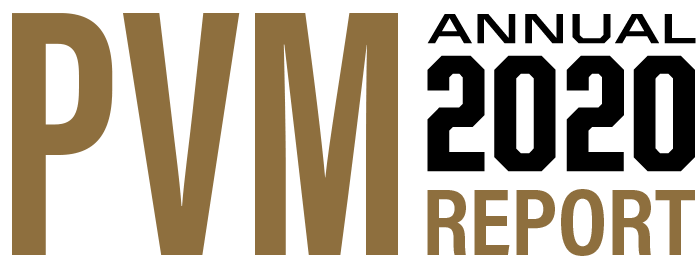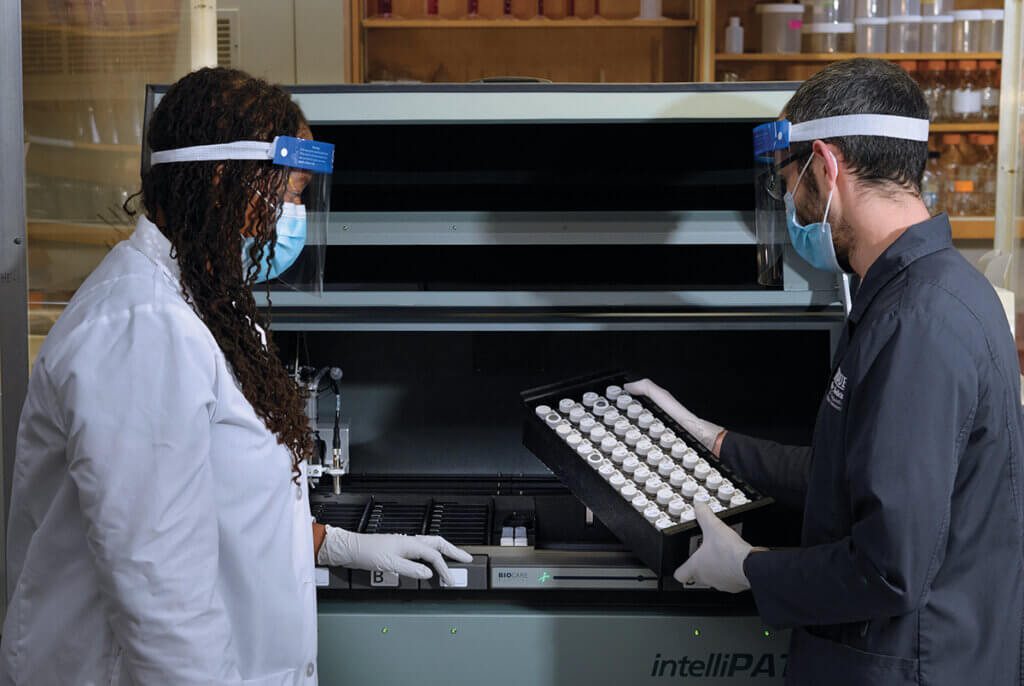
As Boilermakers, Purdue Veterinary Medicine’s team of faculty, staff, and students realizes that persistent planning is key to taking the small steps that enable the College of Veterinary Medicine to persistently pursue the next giant leap. That is why the college has a culture of strategic planning. Since 2010, two five-year strategic plans have been developed and implemented. When the most recent of those plans neared its end in 2020, teams of faculty and staff reviewed the document, taking note of the college’s achievements, and developed a “refreshed” strategic plan with revised and updated action items for the time period of 2021-2023.
As the strategic planning teams reviewed achievements, they developed an impressive list. The plan was organized around the strategic themes of learning, discovery, and engagement and focused on five areas: programmatic excellence; collegiality and collaboration; farm animal focus; investing in people; and investing in infrastructure.
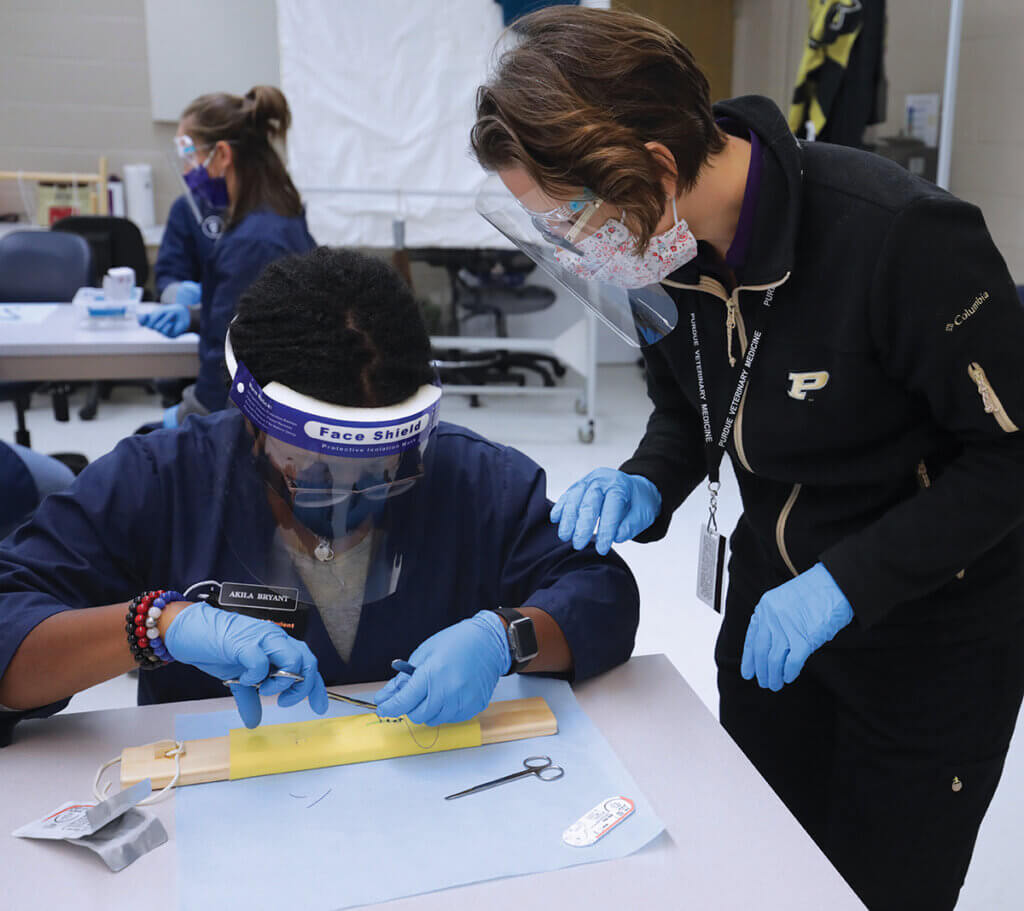
Learning
In the realm of education, the faculty approved the new DVM curriculum for years one through three. Curriculum implementation began in fall 2018 with the Class of 2022. The new curriculum expanded instruction in non-technical professional skills, such as communications, financial management, and personal wellness, and increased hands-on learning with “Veterinary Skills and Competencies” courses as well as other laboratories in the third year. The new curriculum also involved implementing practical assessments to promote student accountability. Additionally, the focus on farm animals was enhanced with new courses including, “Introduction to Production Medicine and Veterinary Ethics,” “Fundamental Principles of Comparative Nutrition,” and an expanded “Food (Farm) Animal Medicine” course in the third-year core curriculum.
Veterinary Nursing became the new name for what previously was called the Veterinary Technology Program. For the on-campus Veterinary Nursing Program, a learning community for Veterinary Nursing students was created to help with student retention and to introduce students to Veterinary Nursing in their first year on campus. Additionally several on-campus courses began utilizing the college’s new Clinical Skills Laboratory to help students learn hands-on skills.
For the Veterinary Nursing Distance Learning Program, a new curriculum was implemented in fall 2017, with all courses offered all three semesters (spring, summer, and fall) using an accelerated plan of study that makes it possible to complete the program in three years (nine semesters). In addition, expanded workshops on campus made it possible for distance learning students to demonstrate and document acquisition of essential skills on domestic animals that they might normally have limited access to, such as horses and cattle.
Discovery
Under the theme of discovery, accomplishments included increasing research funding six percent overall from 2015 to 2019, with an increase of 30 percent in federal funding. Interdisciplinary teams were created involving basic and clinical faculty to address critical areas of biomedical research including cancer immunotherapy and orthopedics. The college also improved the function and staffing of the Center for Comparative Translational Research. Additionally, a shared laboratory for clinical research faculty was created, laboratories were modernized, and investments were made in new equipment.
Engagement
For the Purdue University Veterinary Hospital, accomplishments included making significant additions to equipment and expertise to enhance service and operations, including expansion and growth of the Physical Rehabilitation and Ophthalmology Services, expanding Orthopedic Services, and providing hemodialysis and therapeutic plasma exchange. The hospital experienced year-on-year growth with a strong caseload as construction began on the Small Animal Hospital expansion, and new Equine Hospital and Farm Animal Hospital facilities.
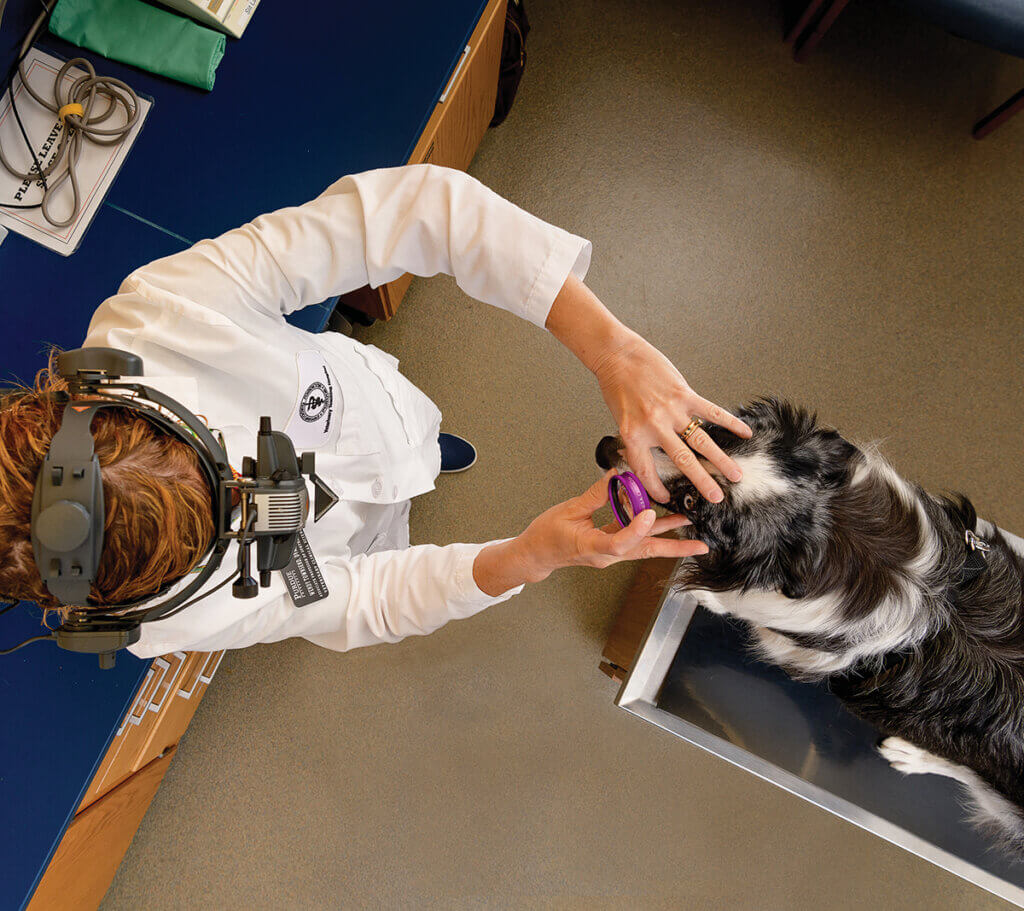
The Animal Disease Diagnostic Laboratory retained full accreditation in 2019 after a customary audit by the American Association of Veterinary Laboratory Diagnosticians. Investments were made in equipment for Serology, Molecular Diagnostics, and Bacteriology. Additionally, Serology and Molecular Diagnostics benefitted from relocated, redesigned, and renovated Serology Laboratory space.
As part of the college’s focus on farm animal, several faculty with expertise in farm animal sectors were recruited and a nucleus of expertise in bovine theriogenology and dairy medicine was developed. In addition, collaborations with the Department of Animal Sciences in the College of Agriculture were strengthened.
Another key goal of the strategic plan involved fostering a diverse and inclusive climate with a welcoming and nurturing atmosphere that attracts and retains the best students, faculty, and staff. Toward that end, the college’s Diversity Action Committee and subcommittees carried out the PVM Diversity, Equity and Inclusion Strategic Plan, focusing on recruitment and retention of diverse students, staff, and faculty. The college also established Faculty and Staff Awards for Excellence in Diversity and Inclusion and made the first award presentations in 2019. Moreover, with support from the Association of American Veterinary Medical Colleges and the American Veterinary Medical Association, nearly 1,500 students, faculty, staff, and veterinary professionals from 31 U.S. colleges and schools of veterinary medicine, as well as private practice and industry, enrolled in the certificate programs for Diversity and Inclusion in Veterinary Medicine that are presented by Purdue University through the Center of Excellence for Diversity and Inclusion in Veterinary Medicine.
The college’s global engagement also grew significantly, with the number of PVM students who studied abroad annually increasing from 22 to 83 during the strategic plan time-frame. Additionally, the percentage of the graduating DVM class with global engagement experience increased from 26 percent to 62 percent, and the number of active university exchange partnerships nearly doubled from 11 to 21. The number of international visitors to the college increased from 33 to 74 and the number of countries represented grew from 17 to 24. The college also launched a Global Veterinary Medicine Certificate Program with 350 DVM students participating.
Another key aspect of the college’s accomplishments involved promoting the veterinary profession. The popular Boiler Vet Camps were expanded to 50 campers each and an Indiana State Fair Camp was launched. Also, This is How We “Role” ― a program aimed at diversifying the veterinarian-scientist workforce ― provided PVM and 19 other colleges of veterinary medicine and their community partners with resources to launch local chapters including role model certification, funding, and a 50-plus lesson curriculum. Additionally, the college launched Vet Up! The National HCOP Academy for Veterinary Medicine with funding through a $3.18 million HRSA grant. The academy provides academic, financial, and social support through three programs including a yearlong program for rising high-school juniors/seniors, adult learners and undergraduate students; a six-week-long residential summer program for undergraduate students; and the DVM Scholars program that supports PVM veterinary medical students from matriculation to graduation.
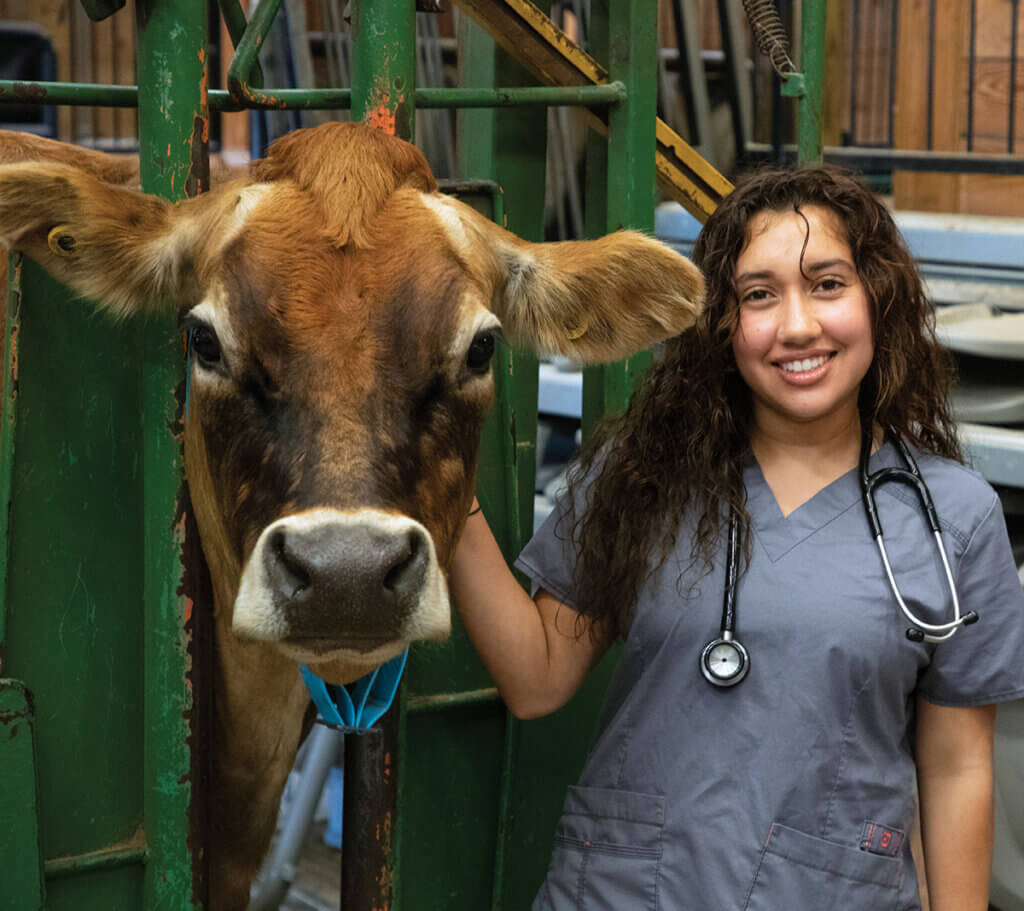
These are just some of the accomplishments traced back to the college’s 2015-2020 strategic plan. With the refreshed plan for 2021-2023, the college will continue focusing on the same strategic themes as it seeks to globally advance animal health and welfare and human health through excellence in learning, discovery, and engagement.
The college’s vision is that:
- Our graduates will excel in their choice of veterinary/biomedical careers.
- We will advance global animal and human health and well-being through transformational and interdisciplinary research.
- We will be a recognized authority for animal and public health through collaborations in medical care, diagnostics, education, and discovery.
With the intent of “Moving Forward Inclusively,” the refreshed strategic plan lays out goals for each of the three themes of learning, discovery and engagement, with a continued emphasis on the focus areas of:
- Programmatic Excellence – educating career-ready veterinarians, veterinary nurses, and scientists who are prepared to enter diverse types of positions in private practice, industry, government, and academia
- Collegiality and Collaboration – faculty collaborating with scholars in other colleges on the Purdue University campus and at the Indiana University School of Medicine, as well as with scientists at universities, research institutions, and companies across the U.S. and abroad
- Farm Animals – recognizing the importance of agriculture to Indiana and the world, the college provides healthcare to farm animals, leads teams of scientists to solve problems affecting human and animal health, such as antimicrobial resistance, and educates the veterinary professionals who will protect the safety and security of our food supply
- Investing in People – providing opportunities for the members of the PVM family to enhance their technical and non-technical skills, which are essential for excellence in service and scholarship
- Investing in Infrastructure – working with the University to create a master plan for an expanded veterinary medical complex, as construction of a new veterinary hospital is underway, providing additional space for the Small Animal Hospital as well as new Equine and Farm Animal Hospitals; and continuing to persistently plan for the future, investing in equipment and facilities needed for state-of-the art clinical and diagnostic services, leading-edge research, and modern learning environments for our students
Click here to view the complete refreshed strategic plan for 2021-2023 on the college’s website.
Diversity, Equity and Inclusion Strategic Plan
Commensurate with the refreshed strategic plan, the college’s Diversity Action Committee unveiled a new Diversity, Equity and Inclusion Strategic Plan in 2020 that charts the course for strengthening the college’s diversity efforts with an emphasis on intentionality.
The plan establishes four strategic goals, delineates key initiatives for each goal, and describes anticipated outcomes to be achieved. The goals are:
- Integrate diversity, equity, and inclusion into the academic principles of teaching, research, and engagement;
- Recruit and advance a diverse community of faculty, staff, and students;
- Elevate the PVM brand by expanding audience reach through more diverse channels; and
- Cultivate a culture of excellence that supports a diverse and inclusive environment.
When effectively implemented, the initiatives set for each goal area will achieve the following anticipated outcomes:
- Increased cultural competence and commitment modeled by all members of the PVM community;
- Increased access and opportunity for growth;
- Increased visibility of the PVM brand among diverse populations; and
- Improved supportive learning and work environment, which gives a stronger sense of belonging.

